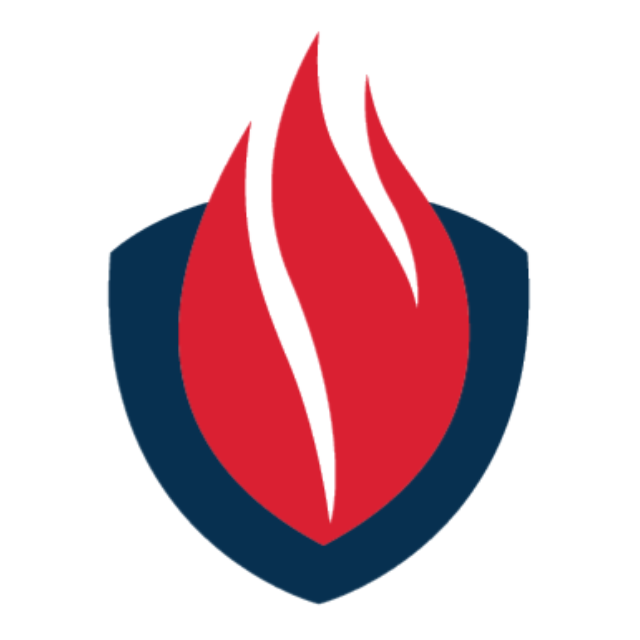Programs Offered
B.Tech (CIVIL)
Intake – 60
M.Tech
(Structural Engineering)
Intake – 24
Core Competencies
- Structural Engineering
- Geotechnical Engineering
- Water Resources Engineering
- Earthquake Engineering
- Transportation Engineering
- Environmental Engineering
Vision
To be a pioneer in carving out world class civil engineers.
Mission
- To create productive environment for the graduates to be competent globally.
- To foster dedicated innovative teaching and learning environment by emphasizing planning and design aspects of civil engineering problems through lifelong learning.
- To establish centre of knowledge in emerging areas of civil engineering in collaboration with industry.
About CIVIL Department
Overview
The Department of Civil Engineering founded in 2013, built a reputation for equipping students with the most complete education & hands-on research. In a short span of existence, the department has established itself as an inspiring learning center. The highly qualified faculty train inspire the students towards research and groom them to address societal problems.The approach makes learning exciting and prepares students to have amazing opportunities. The faculty team with award winning senior professors encourages the students for holistic development. The practical focus is reinforced in all the courses. The curriculum inclusive of students working in proximity with faculty facilitates mastery of in-depth domain knowledge. The students’ academic achievement and impressive placements is a testament for the high acclamation of the department. The vast professional body initiatives and industry connections create an environment for the students to gain expertise that leads to demanding careers filling the expanding industry needs. The department always believes in the Industry institute interaction and has great focus on structured internship in core and interdisciplinary domain to make the students be an industry ready for the future career.
Prominent Features
- Established Centre of excellence for sustainable construction practices and materials in Association with Ultratech Cement on 06.04.2024
- Accredited by the NBA
- Received the Third party Quality control for GHMC consultancy project
- Honored with Best student chapter award in Concrete Excellence Award from Indian Concrete Institute for the year 2019, 2020,2021 & 2023
- Offers Well-designed and highly disciplined internship programs make students industry-ready
- Active MoUs for exposing students for Field visits, Training programs, industry oriented technical sessions, internships & placements.
- Inaugurated ICI Knowledge Centrefor Telangana region on 14 September 2019 to promote Industry Institute Interaction
CIVIL Team
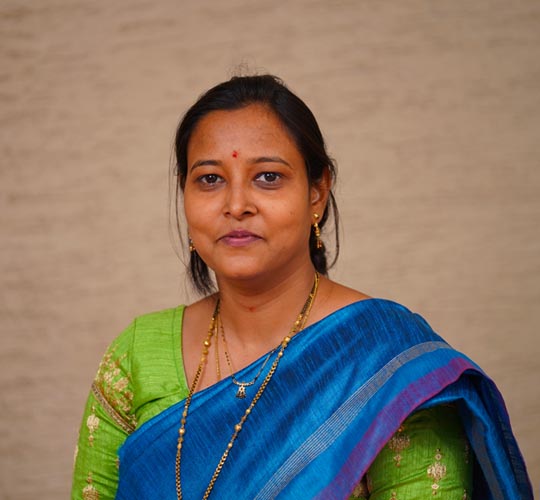
Dr. Pallavi Badry
BE(VNIT), Ph.D(IIITH)
Head of the Department
Dr. Pallavi Badry completed Bachelor degree in Civil Engineering from Visvesvaraya National Institute of Technology, Nagpur and Ph. D in Geotechnical Earthquake Engineering from IIIT Hyderabad. She also serves as Guest faculty in the College of Engineering Osmania University, for the PG geotechnical engineering and Executive Committee member for Indian Geotechnical Society Hyderabad Chapter. She has more than 15 years of experience in teaching, research and industry. Her expertise in research was benchmarked with around 55+ technical papers in indexed journals and in National and International peer-reviewed conferences. She guided 50+ BTech students and 15 Mtech students and 1 PhD student. She has 5 book chapters, 1 book and 1 International patent on her credits. She published her research in several countries like Japan, Turkey, France & Egypt. She is the recipient of International travel grant in 2014 and 2018 by SERB Prestigious International travel grant. She served as a Resource Person for several Faculty Development programs, workshops, internships within the state and other states. She delivered invited lectures in several short courses conducted at IIITH, training for trainee engineers from Govt. of Telangana and Andhra Pradesh, CRHRDI on safety and Geotechnical aspects of the design of superstructures. She is a life member of IGS and mentor for ICI student chapter at Vidya Jyothi Institute of Technology. Under the guidance of Civil Engg Department students received Best students chapter award in the year 2019 and 2020 by ICI. She is awarded as Young Engineer for the state of Telangana for a year 2020 for Concrete Excellency awards series. She is awarded as a “Dynamic Women professional” by Sree TMT and ICI on the occasion of Women’s day. She is a very active and efficient faculty who introduced several employability and bridge courses in the B. Tech and M. Tech curriculum. She is External Board of Studies member for several autonomous colleges in Telangana.
Faculty Members
| Name | Qualification | Designation |
| Dr Pallavi Badry | MS and Ph.D | Professor |
| Dr. E. Sai Baba Reddy | ME/M.Tech and PhD | Professor |
| Dr. Saduwale Shrihari | ME/M.Tech and PhD | Professor |
| Dr. N. Sudharsan | ME/M.Tech and PhD | Professor |
| Dr. P Rajashekar Reddy | ME/M.Tech and PhD |
Associate Professor
|
| Dr. Gaurav Tyagi | ME/M.Tech and PhD |
Assistant Professor
|
| Ashwin Kumar M | ME/M.Tech |
Assistant Professor
|
| Tirumala Deepika | ME/M.Tech |
Assistant Professor
|
| E Giriprasad Goud | ME/M.Tech |
Assistant Professor
|
| G Ratnakar Goud | ME/M.Tech |
Assistant Professor
|
| V Swathi | ME/M.Tech |
Assistant Professor
|
| Vithal | ME/M.Tech |
Assistant Professor
|
| K.Roja | ME/M.Tech |
Assistant Professor
|
| Gedela Sreeja | ME/M.Tech |
Assistant Professor
|
| Muddana Mounika | ME/M.Tech |
Assistant Professor
|
| V Navodaya | M.E/M.Tech |
Assistant Professor
|
| Thirumala Sujatha | M.E/M.Tech |
Assistant Professor
|
| Dhanasure Pooja | M.E/M.Tech |
Assistant Professor
|
| Divya vani B | M.E/M.Tech |
Assistant Professor
|
| Anand | M.E/M.Tech |
Assistant Professor
|
| G Uma Shanker | M.E/M.Tech |
Assistant Professor
|
| SaiKiran | M.E/M.Tech |
Assistant Professor
|
| Rahul Patil Patlolla | M.E/M.Tech |
Assistant Professor
|
| Rebba Abhigna | M.E/M.Tech |
Assistant Professor
|
Outcome Based Education
PEO's
PEO1: To prepare graduates to solve field problems by applying basic mathematical and scientific principles.
PEO2: To prepare graduates as professional engineers by teaching them optimum planning, design, analysis with recent technologies.
PEO3: To empower graduates to explore multidisciplinary corridors emphasizing on environmental and sustainability issues.
PO's
Engineering Graduates will be able to:
- Engineering knowledge: Apply the knowledge of mathematics, science, engineering fundamentals, and an engineering specialization to the solution of complex engineering problems.
- Problem analysis: Identify, formulate, review research literature, and analyze complex engineering problems reaching substantiated conclusions using first principles of mathematics, natural sciences, and engineering sciences.
- Design/development of solutions: Design solutions for complex engineering problems and design system components or processes that meet the specified needs with appropriate consideration for the public health and safety, and the cultural, societal, and environmental considerations.
- Conduct investigations of complex problems: Use research-based knowledge and research methods including design of experiments, analysis and interpretation of data, and synthesis of the information to provide valid conclusions.
- Modern tool usage: Create, select, and apply appropriate techniques, resources, and modern engineering and IT tools including prediction and modeling to complex engineering activities with an understanding of the limitations.
- The engineer and society: Apply reasoning informed by the contextual knowledge to assess societal, health, safety, legal and cultural issues and the consequent responsibilities relevant to the professional engineering practice.
- Environment and sustainability: Understand the impact of the professional engineering solutions in societal and environmental contexts, and demonstrate the knowledge of, and need for sustainable development.
- Ethics: Apply ethical principles and commit to professional ethics and responsibilities and norms of the engineering practice.
- Individual and team work: Function effectively as an individual, and as a member or leader in diverse teams, and in multidisciplinary settings.
- Communication: Communicate effectively on complex engineering activities with the engineering community and with society at large, such as, being able to comprehend and write effective reports and design documentation, make effective presentations, and give and receive clear instructions.
- Project management and finance: Demonstrate knowledge and understanding of the engineering and management principles and apply these to one’s own work, as a member and leader in a team, to manage projects and in multidisciplinary environments.
- Life-long learning: Recognize the need for, and have the preparation and ability to engage in independent and life-long learning in the broadest context of technological change.
PSO's
PSO1:Proficiency in Core subjects The graduates of this program will be able to demonstrate proficiency in the core areas of Structural, Geotechnical and Water Resource Engineering.
PSO2:Professional Proficiency The graduates will be able to design and implement alternate Civil Engineering solutions to the real-world problems.
Life @ CIVIL Department
Events / Activities / News
Stay connected and informed with latest engineering news and events, and engage with the college community.
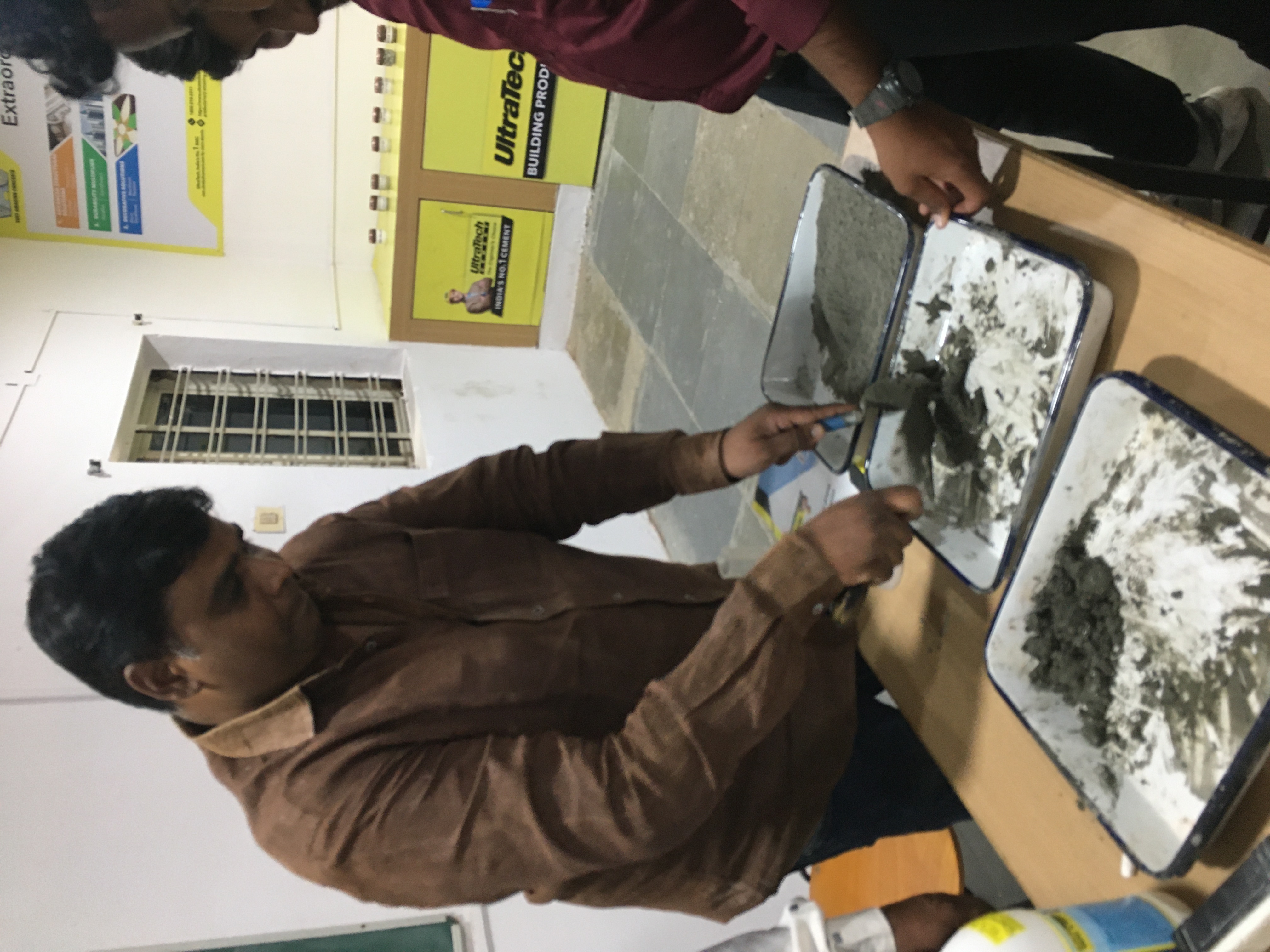
Skill Development Programme (SDP) On Sustainable Materials & Computation in Civil Engineering
The Civil Engineering Department of Vidya Jyothi Institute of Technology (VJIT) organized a Skill Development...
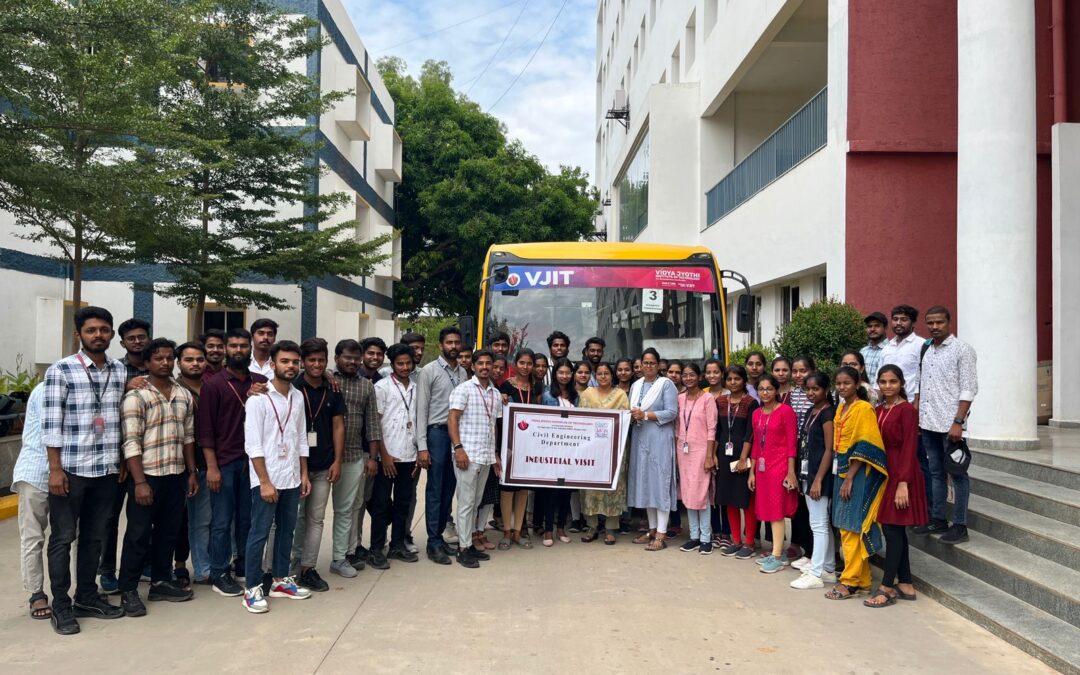
An Industrial Visit to RMC Plant
The Civil Engineering Department of Vidya Jyothi Institute of Technology organized an Industrial Visit to the RMC...

Training program on Concrete Mix Proportion as per IS 10262-2019
The Civil Engineering Department of Vidya Jyothi Institute of Technology organized a Training program on Concrete Mix...
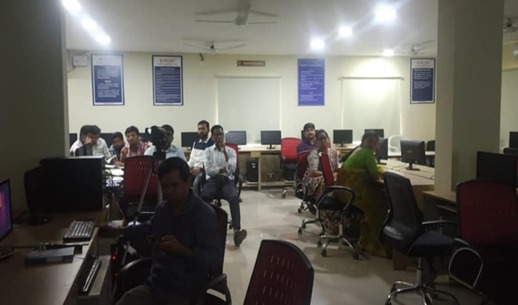
FDP on Sustainable Materials and Computation
The Civil Engineering Department of Vidya Jyothi Institute of Technology (VJIT) organized “Faculty Development...
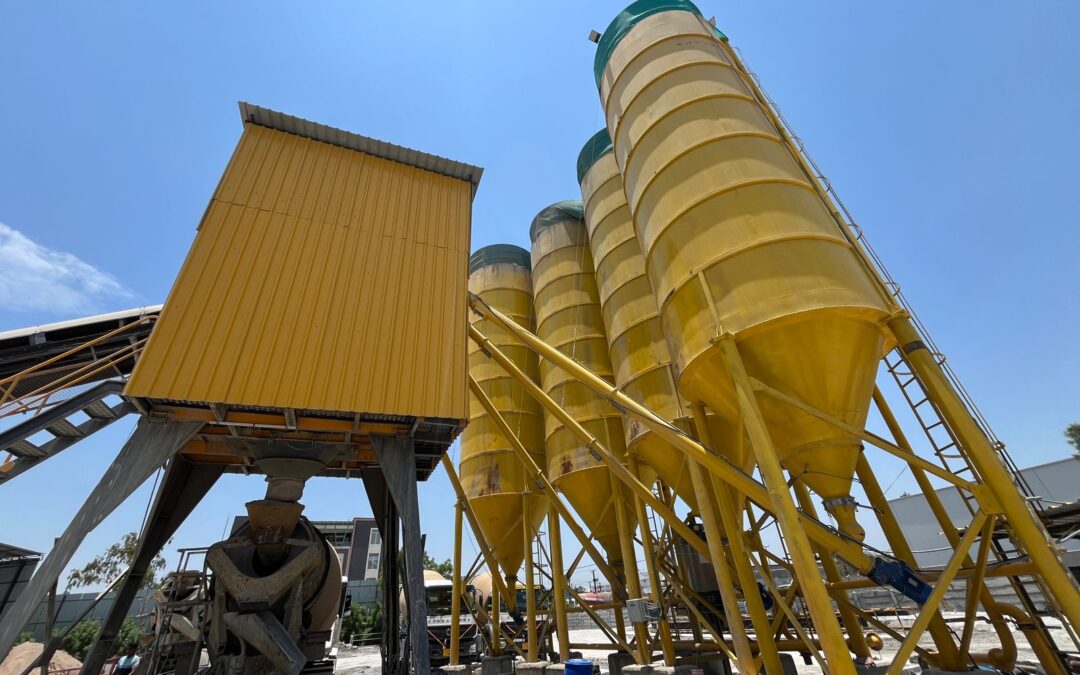
Internship on Sustainable materials & Computations in Civil Engineering.
Civil Engineering Department of Vidya Jyothi Institute of Technology (VJIT) organized an Internship on “Sustainable...
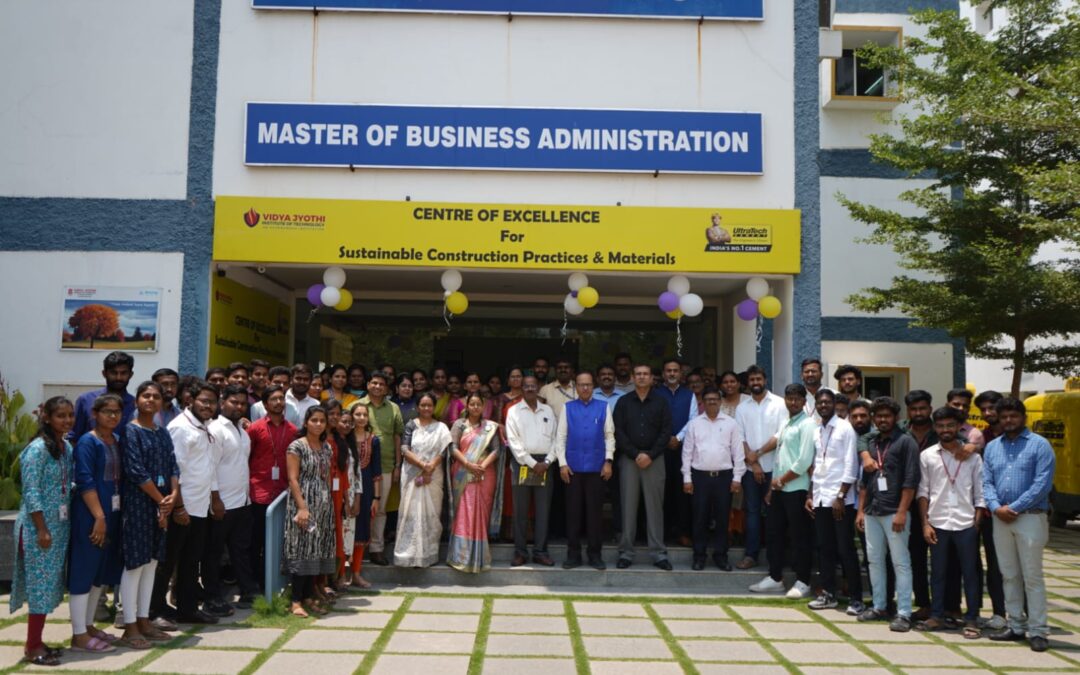
Centre of excellence on Sustainable construction practices & materials
Civil Engineering department of VJIT Inaugurates 1st centre of excellence in Telangana on “Sustainable construction...
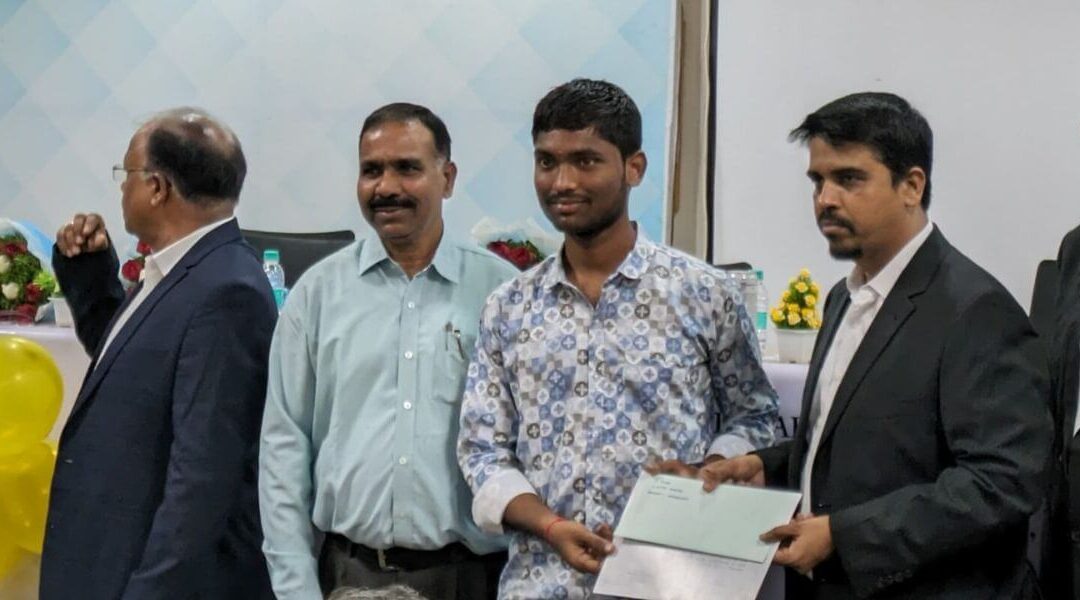
Congratulations
Congratulations to Mr. Likhith Kumar, II Year UG student for securing first place and winning the cash prize in CADD...
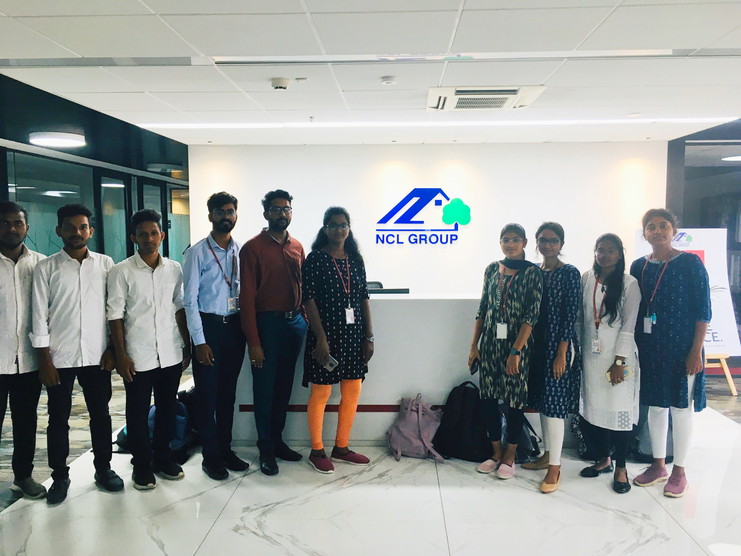
Industrial visit to NCL (Nagarjuna Cement Ltd)
An industrial visit was organized by the Civil Engineering Department to NCL (Nagarjuna Cement Ltd) at Sarojinidevi...
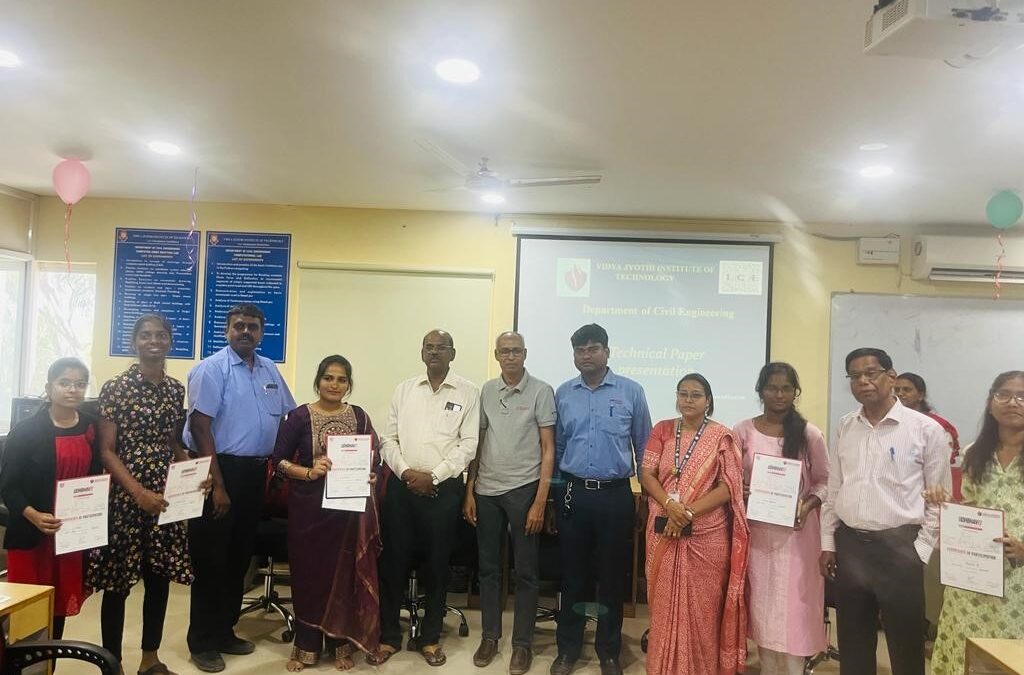
PAPTRIX-UDBHAV 2024
Vidya Jyothi Institute of Technology, organized UDBHAV 2024, on 1st and 2nd, 2024, On this occasion, the Civil...
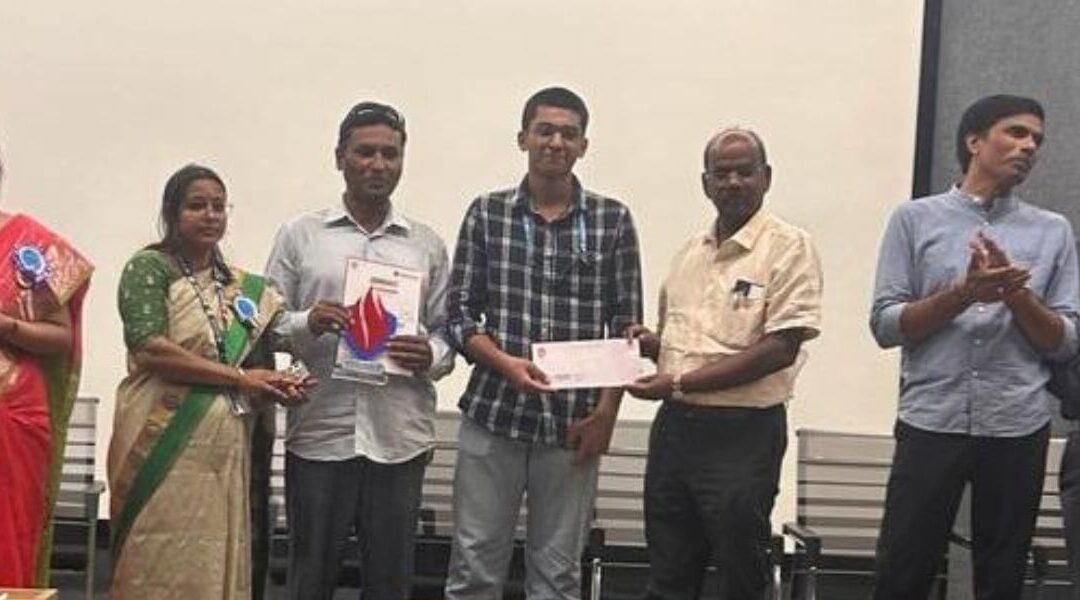
UDHBHAV 2024
Vidya Jyothi Institute of Technology, organized UDHBHAV’2024, on 1st and 2nd March 2024, On this occasion Civil...
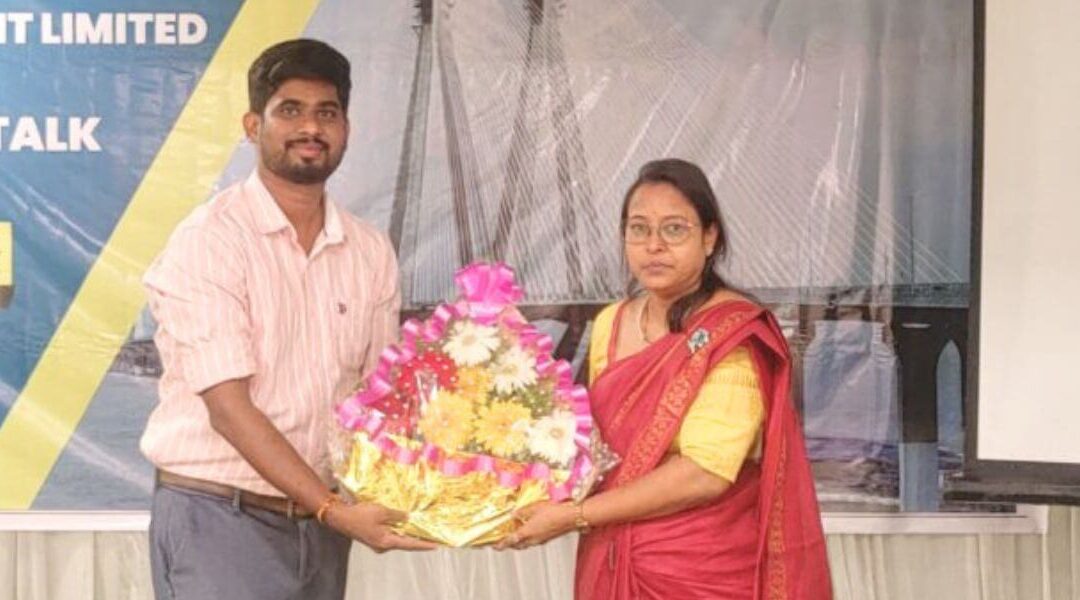
Civil Dept Achievements
Dr. Pallavi Badry, Professor and Head, Civil Eng Dept invited as Judge for an event Paper presentation...
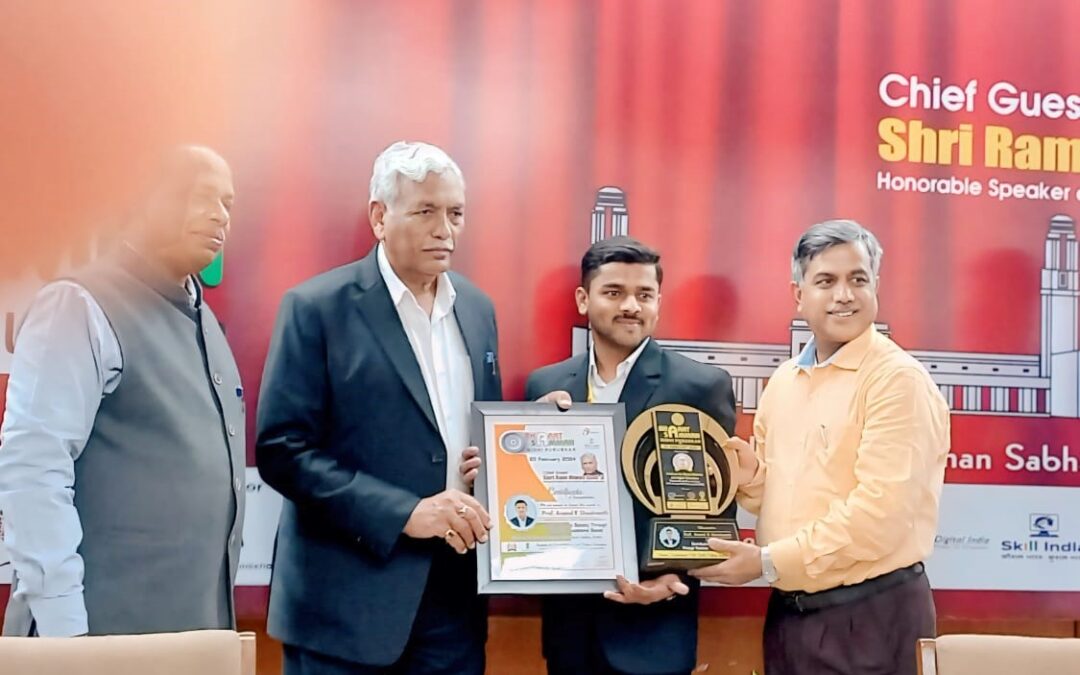
Congratulations
Congratulations......Anand K Sheelvanth , Assistant Professor, of Civil Engineering has Received: "Bharat Samman Nidhi...
Achievements
Department Achievements
- Civil B. Tech Program have been accredited by NBA, valid till 2024.
- Received Jury ICI Young Engineer Category award to the ICI students chapter of VJIT, of the year 2020 in Telangana from professional body, Indian Concrete Institute at state level in a year.
- Received Best Student Chapter Award for the year 2019 in Telangana from professional body, Indian Concrete Institute at state level in a year.
Faculty Achievements
- Dr Pallavi Badry, Professor & Head, CE received ICI Young Engineer Category award of the year 2020 of Telangana by Indian Concrete Institute, Telangana Chapter.
- Dr Pallavi Badry, Professor & Head, CE, Co-chaired a session (Session 13) in 3-day International Conference on Transformations in Engineering and Educations (ICTIEE20) during Jan, 6th to 8th ,2020 organized by Anurag university in collaboration with Indo Asian collaboration committee.
- Dr Pallavi Badry, Professor & Head, CE received International Travel Grant (ITS-SERB) by Science & Engineering board, New Delhi to present her research in International Congress and Exhibition Sustainable Civil Infrastructures: Structural Integrity at Cairo, Egypt, During Nov 24th to 28th 2018, organized by Egypt Government.
- Dr Pallavi Badry, Professor & Head, CE and Ms. Swathi, Assistant Professor, CE Best Paper Award with cash price for Development of educational Model of the shake table to access the building response under Earthquake in 1st National Conferences on Advances of Construction Engineering for Sustainability (NCCS 17). 6th October 2017 at ICFAI Tech School Hyderabad.
- Dr S Srihari, Professor, CE, received 2 Gold Medals for courses Strength of Materials and Design of Reinforced Concrete Structures in NPTEL in a year 2019.
- Dr S Srihari, Professor, CE, Received Collaborative Research Grant under TEQIP-III by JNTUH, for the project Microbially Induced Calcite Precipitation For Crack remediation in concrete structure , in year 2019
- Dr N Sudharsan, Professor, CE received Outstanding Thesis in the Field of Concrete in Telangana for 2020 by Indian Concrete Institute, Telangana Chapter.
- Dr Kamalini Devi, Assoc. Professor, CE, Received International Travel Grant (ITS-SERB) by Department of Science & Technology, New Delhi to present paper at International Conference at River Flow 2018 at Irstea, Lyon-Villeurbanne, France.
- Dr Kamalini Devi received Snigdhashri Patra Memorial Gold medal for the Best Ph.D Thesis of 2017-18 an endowment prize for the year of 2018 at 16th Convocation, NIT- Rourkela.
- Dr Kamalini Devi, Assoc. Professor, CE, Received Er. Govinda Chandra Sahu award from the Institution of Engineer India, Odisha State centre in 2019 for her outstanding contribution in research in the area of water recourses and Engineering .
- Dr Kamalini Devi, Assoc. Professor, CE received Gold Medal for the course Water Supply Engg in NPTEL in year 2020.
- Dr Kamalini Devi, Assoc. Professor, CE received Silver Medal for the course Fluid Mechanics in NPTEL in year 2019 .
- S. Nagarjuna, Assistant Professor, CE received Silver Medal for the courses Strength of Materials in NPTEL in a year 2018.
- Mr. G. Srinath, Assistant Professor, CE received, Assistant Professor, CE, Received cash prize for a Guiding Students for poster presentation ASCE-IGS conference and seeking a second position in poster presentation, organized by MEC College in a year 2019.
- Dr Kamalini Devi, Associate Professor of Department of Civil Engg had been invited for expert lectures at NIT Rourkela in 2018 for her work in the field of River Hydraulics.
- Dr Kamalini Devi, Associate Professor of Department of Civil Engg has visited many reputed foreign universities Such As Sheffield University, UK, St Louis University, USA, University of Leeds, UK, Utah State University, USA,University ofIrestea, Lyon (France), University of Utah (USA) to present her research work and it’s related discussion.
- Dr Kamalini Devi, Associate Professor of Department of Civil Engg has reviewed many reputed journals such as Journal of fluid mechanics, Journal of Water Resources management, Elsevier, Flow Measurements and Instrumentations, Elsevier, International Journal of Sediment transport, Elsevier, Advances in Water resources Engineering, Elsevier, Journal of Hydraulic research, ISH, Taylor and Francis.
Professional Bodies & Clubs
Clubs
- DELTA Club
- HITA
- Street Cause
- Yukthi
- Photography Club
Industry & Academic Collaborations
Other Information
Resources
Teaching & Learning
Innovative Teaching Techniques
Teaching is an art and science. Teaching is a process of imparting knowledge and skills. It is a systematic process based on some educational objectives to communicate.
The following innovative teaching methods are being adopted:
ICT based learning
Use of LCD projectors, using ppt presentation and provision for interactive teaching learning, ICT can impact student learning when teachers are digitally literate and understand how to integrate it into curriculum. The use of ICT in education creates a learning environment that focuses on students and addresses the gap between teacher and learner centre environments
Collaborative learning
It is the educational approach of using group activities to enhance learning through working together. Groups of three or more learners work together to solve problems, complete tasks, or learn new concepts. This approach makes students actively engages towards learning process and synthesize information and concepts.
Demonstration Based Learning
An instructional method through which students are shown proper techniques, equipment, or information about processes and procedures of real-world system (Its process /parts of whole system) are demonstrated using tools
Visualizations
In this method students are approached with videos related to the concept which enhances the level of learning for the students, through this the concept can be presented as videos, images, diagrams, illustrations, or robust interactive activities with multiple components.
Digital laboratory for self-learning (Virtual Labs)
Virtual Labs are simulated learning environments that allow students to complete laboratory experiments online and explore concepts and theories without stepping into a physical science lab. With this approach students is facilitate to operate labs anytime anywhere education during their preparation for lab sessions or clarifying the doubts after labs sessions.
Google Classroom
The Google classroom is an innovative tool which is very effectively used in our campus for few courses. Faculty members add all students to it before commencement of every semester for every course. They also upload course plans, eBooks, course materials, video lectures, question banks etc. It helps the students to come prepared to the class. The tools in the Google class room facilitate online assessment of students, which can be used to measure the outcomes of each course.
NPTEL and SWAYAM (Self- learning Courses)
The students are using E-sources such as NPTEL and SWAYAM courses for effective teaching and learning respectively These not only strengthen the teaching-learning process for the students, but also generate academic discipline, scientific, attitude, innovativeness and inculcate self-learning. The following tables show the NPTEL courses successfully completed by our students.
Value added courses
Value added course is the short term training course which enhances the proficiency in core knowledge collaboration with the current industrial requirements coped up with the curriculum for the knowledge enhancement of the internal stakeholder.
Field and Industrial Visits
Construction site visits are the most powerful learning aid in the civil Engineering to explain the concept practically.Industrial visits to Research laboratories, Green Building Centres, working construction Site etc, help to explore an opportunity and allow the students to make real-life decisions and to become lifelong learners.
Internship
At the end of III-year II semester the students are encouraged to carry out internship in reputed industries/companies to get practical exposure from industries. It helps the students to bridge the gap between the subject studies and industrial need. This internship also helps students develop ideas for real time projects. The department encourages all students to avail internships with core industries the following table shows the sample statistics on internships availed by students for AY 2022-23.
Project Based Learning (PBL)
As a Part of Curriculum students undergo with major projects within a group of 3-4 students and they identify the project area / title; obtain the consent of faculty/industry professionals to guide them. Finally, the projects Will be evaluated by the internal and external faculty members.
Conference/Workshop/Seminars/Expert Lecture
The Department organizes conferences/workshops/seminars/expert lectures every year to enrich the knowledge of students. This provides a platform for both the faculty and students to share their knowledge and to hold discussions with eminent speakers from both academia and industry and also with their peers. These Events help the students to acquire different soft skills. Apart from the workshops, Technical Talks and symposiums students are exposed to major Technical events and involved in organization of such event. Recently department of Civil Engineering organized 2-Day International conference on Advancements in Construction Materials (ICACM 2023), where faculty and students were involved in several phases of planning and organizing and hosting several national and international delegates. A brief report about the conference is presented below.INDO-AFRICAN Conference Series A Two-Day International Conference on Advancements in Construction Materials (ICACM 2023) Department of Civil Engineering, has Organized INDO-AFRICAN Conference Series A Two-Day International Conference on Advancements in Construction Materials (ICACM2023) was held in the VJIT, Hyderabad on 28th & 29th ,April2023 on Hybrid Mode, in Association with Copperbelt University (University in Kitwe, Zambia), Mattu University (Metu, Ethiopia),Indian Concrete Institute, ASCE (Indian Section Southern Region).The conference was inaugurated by Dr. E. Saibaba Reddy, Director and Dr. A. Padmaja principal of Vjit, Dr.Pallavi Badry, HOD, CE, Chief Guest Dr. Brett Phillips, ASCE member communities committee chair, ASCE MCC Global members Taskforce, Australia, Guest of honor Dr. V. Sundar, professor Emeritus, dept of Ocean Engineering, IIT madras, and Mr. Poloju Narsimha Chary, ASCE India Section Southern Region Past President. The conference was very interactive and has offered good platform to deliver the latest Technologies in Construction Materials to the Researchers, Academicians & Industry professionals to interact among each other for future growth in each domain.




Laboratories
Surveying & Geomatics Lab
Course Outcomes
At the end of the course, the student will be able to:
- Apply the principle of surveying for civil Engineering Applications
- Calculation of areas
- Drawing plans and contour maps using different measuring equipment at field level
- To learn the applications of GPS in surveying system
- Write a technical laboratory report
List of experiments
- Survey of an area by chain surveying.
- Determination of two inaccessible points by using prismatic compass.
- Surveying of a given area by prismatic compass (closed traverse) and plotting after adjustment.
- Radiation & intersection method by plane table survey.(Any one exercise)
Exercise on fly levelling using dumpy level. - An exercise on L.S, C.S and Plotting
- Trigonometric leveling – Heights and distance problem
- Determination of Area & Remote height using total station
- Traversing & Contouring using total station
- Distance, gradient, Diff. height between two inaccessible points using total station
- Study on use of GPS for data collection
- Collection of Point Data, Line Data, and Polygon Data using GPS.
Engineering Geology Lab
Course Outcomes
At the end of the course, the student will be able to:
- To study the physical properties and identification of minerals referred under the theory.
- Describe and identify the rocks referred under the theory.
- Illustrate the Microscopic study of rocks.
- Interpret and draw the sections for geological maps showing tilted beds, faults, unconformities etc.,
- Solve the simple structural geological problems.
List of experiments
- Study of physical properties and identification of minerals.
- Study of physical properties and identification of rocks (Igneous Rocks)
- Study of physical properties and identification of rocks (Sedimentary Rocks)
- Study of physical properties and identification of rocks (Metamorphic Rocks)
- Microscopic study of rocks
- Microscopic study of Minerals
- Study of Geological Structures like Faults and Folds
- Study of Geological Structures like Tilted Bed models and unconformities
- Interpretation and drawing of sections for geological maps showing tilted beds, faults, uniformities etc.
- Calculation of Dip using strike method.
- Calculation of Dip using dip method.
- Calulation of Dip using different angels/inclinations.
Environmental Engineering Lab
Course outcomes
After the completion of the course student should be able to
- Understand principles and their practical application in water treatment.
- Determine physical, chemical and biological characteristics of water and wastewater.
- Determine the optimum dose of coagulant.
- Estimate the chloride, nitrate and iron content in water.
- Summarize the solutions using titration, conductivity meter, pH meter, turbidity meter and DO meter.
List of experiments
- Determination of pH and turbidity
- Determination of Conductivity and total dissolved solids
- Determination of Alkalinity and Acidity
- Determination of Chlorides
- Determination of Iron
- Determination of Dissolved Oxygen
- Determination of Nitrates
- Determination of Optimum dose of Coagulant
- Determination of Chlorine Demand
- Determination of B.O.D
- Determination of C.O.D
- Presumptive Coliform test
Solid Mechanics Lab
Course Outcomes
At the end of the course the student will be able to:
- Predict the behavior of materials under impact, hardness, tensile and compressive loads.
- Determine elastic constants by flexural and torsion test.
- Determine the spring constants under various loadings.
- Understand the deflection of materials under bending
- Understand basic material properties stress and strain.
List of Experiments
- Tension test
- Bending test on (Steel / Wood) Cantilever beam.
- Bending test on simple support beam.
- Torsion test
- Hardness test
- Spring test
- Compression test on wood or concrete
- Impact test
- Shear test
- Verification of Maxwell’s Reciprocal theorem on beams.
- Use of electrical resistance strain gauges
- Continuous beam – deflection test.
Computer Aided Drafting of Building Lab
At the end of the course, the student will be able to:
- Assess the Software with aiding source.
- Draft the Plan and Elevation & Sectional views of the buildings.
- Develop the components of the building.
- Replicate the detailing of framed and Industrial structures.
- Interpret the isometric and orthogonal projection of buildings.
List of Experiments
- Introduction to the basic commands of CADD software.
- Practice exercises on basic commands of CAD software.
- Drawing of single line plans Single storey buildings.
- Drawing of plans of Multi storied buildings with Brick thickeness (Max G+2)
- Developing sections and elevations of Single storey buildings
- Detailing of different types (any 2 types) of doors and its components by using CAD
- Detailing of different types (any 2 types) of windows and its components by using CAD
- Detailed drawing of Roof trusses by using CAD
- Exercises on the development of working of building by using CAD
- Planning of commercial building (School building)
- Fundamentals of Building Information Modelling (BIM)
- Demonstrationon workflow in using BIM in the building life cycle
Geotechnical Engineering Lab
Course Outcomes
At the end of this course the student will be able to
- Demonstrate the engineering properties the soil.
- Illustrate the field bulk and dry density of cohesive and cohesion less soils.
- Classify the Coarse grained soils based on sieve analysis test & a grain size distribution curve.
- Compute the shear strength of cohesive and cohesion less soil.
- Determine the permeability of coarse grained soil and fine grained soil by constant head permeability test and falling head method.
List of Experiments
- Atterberg’s limits
- Fileld density- core cutter and sand replacement method
- Grain size analysis
- Permeability of soil, constant head
- Permeability of soil variable head test.
- Compaction test
- B.R test
- Consolidation test
- Unconfined compression test
- Triaxial compression test
- Direct shear test
- Vane shear test.
Fluid Mechanics &Hydraulic Machinery
Course Outcomes
Students who successfully complete this course will have demonstrated ability to:
- Describe the basic measurement techniques of fluid mechanics and its appropriate application.
- Interpret the results obtained in the laboratory for various experiments.
- Discover the practical working of Hydraulic machines- different types of Turbines, Pumps, and other miscellaneous hydraulics machines.
- Compare the results of analytical models introduced in lecture to the actual behavior of real fluid flows and draw correct and sustainable conclusions.
- Write a technical laboratory report
List of experiments
- Calibration of venture meter and Orifice meter
- Determination of coefficient of discharge for a small orifice/mouthpiece by constant head method
- Calibration of contracted rectangular notch and triangular notch
- Determination of friction factor of a pipe
- Determination of coefficient for minor losses.
- Verification of Bernoulli’s equation.
- Impact of jet on vanes
- Study of hydraulic jump.
- Performance test on Pelton wheel turbine.
- Performance test on Francis turbine
- Performance characteristics of a single stage /multi stage centrifugal pump.
- Performance characteristics of a reciprocating pump
Concrete & Highway Materials Lab
Course Outcomes
- Examine the experimental strength of aggregate materials as per codal provisions.
- Illustrate the stability & properties of bituminous materials & mixes by conducting tests.
- Determine the properties of cement by conducting the test.
- Define the workability of fresh concrete by conducting tests.
- Estimate the strength of hardened concrete by conducting destructive and non destructive testing.
LIST OF EXPERIMENTS
Road Aggregates
- Aggregate Crushing Value.
- Aggregate Impact Test.
- Specific Gravity And Water Absorption.
- Attrition Test.
- Abrasion Test.
- Shape Test.
Bituminous Materials
- Penetration Test.
- Ductility Test.
- Softening Point.
- Flash And Fire Point.
Cement and concrete
- Tests on cements
- Fineness of cement.
- Normal Consistency of cement
- Initial And Final Setting Time of cement.
- Specific Gravity and Soundness of cement.
- Compressive Strength of cement.
Tests On Concrete
- Workability Test on Concrete By Compaction Factor , Slump cone and Vee- Bee.
- Compressive Strength and Young’s Modulus of Concrete.
- Bulking of Sand.
- Non Destructive Testing on Concrete (For Demonstration).
Curriculum
Research & Development
Overview
The Department has Exclusive R&D cell for providing various opportunities for enhancing the research and innovative skills of Faculty and students
Objectives
- To organize various workshops/ seminar on Writing of research articles, filing patents , writing books and improve the quality of publications
- To prove awareness on collaborative research
- Organize Conferences for providing platform to share knowledge in the recent trends
Expertise
| Research Group Name | Research Group Head |
| Geotechnical Engineering | Dr. Pallavi Badry |
| Special Concrete | Dr.Shrihari |
| Water Resources and Transportation engineering | Dr. Kamalini Devi |
| Innovative Brick and Brick Masonry Structures | Dr.N. Sudharsan |
| Geoenvironmental Engineering | Dr.P.Rajasekar Reddy |
Activities
| Name of The Research Laboratory | Activities |
| Geotechnical Engineering Research Group |
|
| WRE & Allied Engineering Research Group |
|
| Structural Engineering Research Group |
1. One day workshop on Innovative Concretes was held on 19 December 2016 2. A Seminar on Innovative materials in Civil Engineering was conducted on 22 July 2016 3. Two days seminar on Development of green material for green building technologies was held on 06 & 07 March 2017 4.Two days national seminar on Repair and Rehabilitation of the Construction Structures conducted on 16 & 17 March 2018 5. Inauguration of ICI Knowledge center on 14 September 2019. |
Projects and Grants
2022-2023
| S.No | Title of the Grant | Faculty name | Funding Agency | Amount in Rs |
| 1 | International Conference on Advancements in Construction Materials | Dr. N. Sudharsan | DST, SERB | 1,25,000.00 |
2020-2021
| S.no | Title of the project | Principal Investigator & Co Principal Investigator | Funding agency | Amount | Status |
| 1. | Microbially Induced Calcite Precipitation For Crack remediation in concrete structure | Dr. V. Srinivasa Reddy, Dr. Ch Sasikala, Dr.S Shrihari | TEQIP –III JNTUH | 2,99,000.00 | Completed |
| 2 | Advances in Finite Element Methods | Dr. E. Saibaba Reddy | TEQIP –III JNTUH | 1,15,000.00 | Completed |
| Name of the Investigator | Project Title | Funding agency | Year | Amount Rs | Status |
| Dr E Saibaba Reddy | Three day faculty development program on Advances in Finite Element Methods | TEQIP –III JNTUH | 2020-2021 | 115000.00/- | Completed |
| Dr Shrihari | Microbially Induced Calcite Precipitation For Crack remediation in concrete structure | TEQIP –III JNTUH | 2019-2020 | 2,99,000.00/- | On- Going |
| Dr Pallavi Badry | International conference on innovative infrastructure solutions at Cairo, Egypt | DST SERB Travel grant | 2018-2019 | 1,00,000/- | Completed |
Consultancy
2022-23
| Project Title | Duration | Funding Agency | Amount (Rs) |
| GHMC Third Party Quality Control work | 12 Months | GHMC, Hyderabad | 6,15,179 |
2021-22
| Project Title | Duration | Funding Agency | Amount (Rs) |
| GHMC Third Party Quality Control work | 12 Months | GHMC, Hyderabad | 4,53,343 |
| Project Title | Duration | Funding Agency | Amount | Year |
|---|---|---|---|---|
| Conditional Assessment of existing 2-storeyed building | 1 month | SVS Projects Private Ltd | 36200 | 2018-2019 |
| Soil test conducted for G+3 residential building at Ragendra Nagar | 1 month | Bhagyashree Constructions | 25000 | 2017-2018 |
| Soil test conducted for G+2 residential building at Lingampally | 1 month | Jhandyala Civil Structural and Architectural Consultants | 20400 | 2016-2017 |
Patents
| Name of the faculty | National/ International | Name of the Invention | Filled Year | Patent / Application Number | Status |
| Dr Pallavi Badry | International | APIC- Recycling C&D Waste: Automatic Process for Recycling C&D Waste Including Concrete Part and Convert Useful Material | 2020 | 2020102728 | Granted |
| Dr. S. Shrihari | National | System And Method For Sensor Based Protection of Loading Frame On A Concrete Sample | 2020 | 202041042281 | Published |
| Dr. S. Shrihari | National | System and method for establishing communication between total station instrument and reflector | 2020 | 202041052714 | Published |
| Dr. N. Sudharsan | National | Glasscrete Building Blocks | 2013 | 354071 | Granted |
| Dr. N. Sudharsan | International | IWNA-Village Sanitation: Intelligent way to Sanitation Village and Notify the Authority. | 2020 | 2020104194 | Granted |
| Dr. Kamalini Devi | International | IBAM-Mineral Water Quality Testing System: IoT-Based Automatic Mineral Water Quality Testing and Management System. | 2020 | 2020103845 | Granted |
| Mr. Anand K. Sheelvanth | National | Energy efficient social housing through the use of sustainable pre engineered cladding | 2022 | 202241056846A | Published |
| Mrs. V. Navodaya | National | Estimation of soil strength using artificial Intelligence methods in geotechnical engineering | 2023 | 202321037972 | Published |
Roll of Honors
Toppers – Batch Wise
| A: Y | II Year | III Year | IV Year |
| 20-21 | Ankathala Vaneshwari
Pathlavath Shiva |
Attada Uma Maheswari
Kotagiri Prashanth |
Kalakota Renuka
Neerati Naresh |
| 21-22 | C Pragathi
Vanama Tejaswini |
Ankathala Vaneshwari
Pathlavath Shiva |
Attada Uma Maheswari
Kotagiri Prashanth |
| 22-23 | Bobbala Sindhu
Anusha Madhusudan |
Mora Keerthana
C Pragathi |
Ankathala Vaneshwari
Pathlavath Shiva |
| BATCH | REGISTER NO | NAME | PERCENTAGE |
| 2016-20 | 16911A01A9 | P. HARIKA | 92.37 |
| 2015-19 | 15911A01A2 | SARDA GOPAL | 86.21 |
| 2014-18 | 14911A0158 | B.NAVYA | 81.25 |
| 2013-17 | 13911A0130 | K. SREEJA | 82.95 |
Toppers – Semester Wise
Mentor List
Mentors List for AY 2022-23
|
Year |
Faculty Name |
List of the students under mentorship |
No. of students |
|
II YEAR |
Mrs. Dhanasure Pooja |
21911A0101 to 21911A0118 |
16 |
|
Mrs. T. Sujatha |
21911A0119 to 21911A0138 |
18 |
|
|
Mr. Saikiran |
21911A0139 to 22915A0104 |
14 |
|
|
Mr. M. Ashwin Kumar |
22915A0105 to 22915A0118 |
14 |
|
|
III YEAR |
Mr. G. UmaShankar |
20911A0101 to 20911A0120 |
20 |
|
Mrs. M. Mounika |
20911A0121 to 20911A0140 |
18 |
|
|
Mrs. T. Sarada |
20911A0141 to 20911A0160 |
18 |
|
|
Mrs. Y. Suneetha |
20911A0161 to 20911A0172& 21915A0101 to 21915A0108 |
20 |
|
|
Mr. Vithal |
21915A0109 to 21915A0128 |
20 |
|
|
IV YEAR |
Mrs. T. Deepika |
19911A0101 to 19911A0120 |
20 |
|
Ms. Neerudu Bhumika Samyuktha Priyadarshini |
19911A0121 to 19911A0141 |
18 |
|
|
Mrs. K. Roja |
19911A0142 to 19911A0160 |
20 |
|
|
Mrs. V. Nikhila Bhavani |
19911A0161 to 19911A0181 |
19 |
|
|
Mrs. V. Swathi |
19911A0182 to 20915A0105 |
14 |
|
|
Mr.E. Giri Prasad Goud |
Re-admin: 18911A0104,18911A0120, 18911A0160,18911A0195,18911A0198, 19911A0189,19911A0190, 20915A0106 to 20915A0115 |
14 |
Mentors List for AY 2021-22
|
Year |
Faculty Name |
List of the students under mentorship |
No. of students |
|
II YEAR |
Mr.G. UmaShankar |
20911A0101 to 20911A0120 |
20 |
|
Mrs. M. Mounika |
20911A0121 to 20911A0140 |
18 |
|
|
Mrs. T. Sarada |
20911A0141 to 20911A0160 |
18 |
|
|
Mrs. Y. Suneetha |
20911A0161 to 20911A0172& 21915A0101 to 21915A0108 |
20 |
|
|
Mr. Vithal |
21915A0109 to 21915A0128 |
20 |
|
|
III YEAR |
Mrs. T. Deepika |
19911A0101 to 19911A0120 |
20 |
|
Mrs. Monika Priya |
19911A0121 to 19911A0141 |
18 |
|
|
Mrs. K. Roja |
19911A0142 to 19911A0160 |
20 |
|
|
Mrs. V. Nikhila Bhavani |
19911A0161 to 19911A0181 |
19 |
|
|
Mrs. V. Swathi |
19911A0182 to 20915A0105 |
14 |
|
|
Mr. E. Giri Prasad Goud |
Re-admin: 18911A0104,18911A0120, 18911A0160,18911A0195,18911A0198, 19911A0189,19911A0190, 20915A0106 to 20915A0115 |
14 |
|
|
IV YEAR |
Mr. M. Ashwin Kumar |
18911A0101 to 18911A0119 |
19 |
|
Mr. Anand |
18911A0121 to 18911A0142 |
19 |
|
|
Ms. M. Mounika |
18911A0143 to 18911A0164 |
20 |
|
|
Mr. SaiKiran |
18911A0165 to 18911A0185 |
20 |
|
|
Mrs. Dhanasure Pooja |
18911A0186 to 19915A0101 |
20 |
|
|
Mr. G. Ratnakar Goud |
19115A0102 to 19915A0121 |
20 |
Mentors List for AY 2020-21
|
Year |
Faculty Name |
List of the students under mentorship |
No. of students |
|
II YEAR |
Mrs. T. Deepika |
19911A0101 to 19911A0120 |
20 |
|
Mrs. Monika Priya |
19911A0121to 19911A0141 |
18 |
|
|
Mrs. K. Roja |
19911A0142 to 19911A0160 |
20 |
|
|
Mrs. V. Nikhila Bhavani |
19911A0161 to 19911A0181 |
19 |
|
|
Mrs. V. Swathi |
19911A0182 to 20915A0105 |
14 |
|
|
Mr.E. Giri Prasad Goud |
Re-admin: 18911A0104,18911A0120, 18911A0160,18911A0195,18911A0198,19911A0189,19911A0190, 20915A0106 to 20915A0115 |
14 |
|
|
III YEAR |
Mr. M. Ashwin Kumar |
18911A0101 to 18911A0119 |
19 |
|
Mr. Anand |
18911A0121 to 18911A0142 |
19 |
|
|
Ms. M. Mounika |
18911A0143 to 18911A0164 |
20 |
|
|
Mr. SaiKiran |
18911A0165 to 18911A0185 |
20 |
|
|
Mrs. Dhanasure Pooja |
18911A0186 to 19915A0101 |
20 |
|
|
Mr. G. Ratnakar Goud |
19115A0102 to 19915A0121 |
20 |
|
|
IV YEAR |
Mrs. T. Sarada |
17911A0101 to 17911A0117, Re-admin: 16911A0114, 16911A0129, 16911A0155 |
20 |
|
Mr. Vitthal Biradar. |
17911A0118 to 17911A0140 |
20 |
|
|
Mr. G Uma Shankar |
17911A0141 to 17911A0164 |
20 |
|
|
Mrs. Gedela Sreeja |
17911A0165 to 17911A0185 |
20 |
|
|
Mrs. V Navodaya |
17911A0186 to 17911A01B0 |
19 |
|
|
Mrs.ThirumalaSujatha |
17911A01B1 to 18915A0109 |
19 |
|
|
Mrs. B. Divya vani |
18915A0110 to 18915A0124 |
15 |
Contact Us
Dr. Pallavi Badry
Professor &HOD BE(VNIT),Ph.D(IIITH)
8978567328
[email protected]

